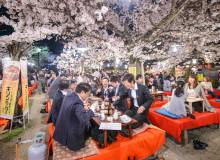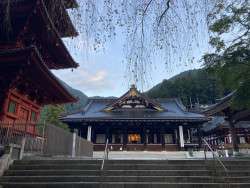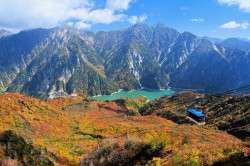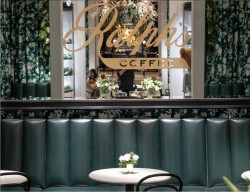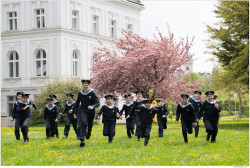
October 1, 2009
Tokyo Green Space
A bevy of local residents and organizations offer surprising visions for creating an urban forest
By Metropolis
Ginza & Omotesando Farms

A field of rice is growing in Ginza? Surely not. Yet in a small alley off Chuo Dori, passersby can visit a rice paddy in a rustic-style structure made of Japanese cedar and surrounded by bamboo, pines, hostas and morning glory. Two ducks born in early July weed the field and add their own natural fertilizer.
Flooding the paddy every morning and draining it in late afternoon is Kazuki Iimura, whose goal is to draw attention to the special qualities of Japanese rice and to bring a small slice of the countryside into one of the world’s most expensive urban commercial districts. Occupying a small plot of land that would otherwise be empty between demolition and construction, Ginza Farm is open to the public and attracts a steady stream of local shop clerks, construction workers, office staff and neighbors.
Iimura has a unique set of skills—he grew up on a farm in Ibaraki and previously worked as a venture capitalist and as a consultant for rural town revitalization. The soil and rice for his Ginza project come from his parents’ farm, but he’s had to make some adjustments to fit the urban environment. Thanks to Tokyo’s ambient light and warmer nighttime temperatures, he’s installed a tall black curtain around the paddy to “help the rice sleep.”
In addition to creating a magical open space in Ginza, Iimura is also pioneering a business that turns unused rooftops into rental farm plots. The first opened last month near Omotesando, next to the Paul Smith boutique, and features 16 plots. Many renters are new to growing vegetables, so Iimura arranges for farmers to come in from the countryside to give advice. After receiving tremendous interest from would-be urban farmers and the media, Iimura plans to open several more rental farms next spring.
Ginza Farm: 2-5 Ginza, Chuo-ku. Open daily 9am to dusk. Free. Nearest stn: Ginza-Itchome, exit 5. www.ginza-farm.jp
Honeybees in Ginza

Photo by Kevin Mcgue

Atsuo Tanaka
Photo by Kevin Mcgue
Just up the street from Ginza Farm, 300,000 honeybees make their home on the rooftop of an anonymous office tower. Ginza Honey Bee Project aims to revive Japan’s honey industry and increase awareness of the relationship between bees, people and the environment.
Like the rest of the world, Japan has been affected by “colony collapse disorder,” which has forced farmers to manually pollinate fruit trees and vegetables; at the same time, the number of Japanese beekeepers has declined from 15,000 to 2,500. Ironically, says Ginza Honey Bee Project co-founder Atsuo Tanaka, Tokyo provides a better habitat for bees because of widespread pesticide use and deforestation in the countryside. From Ginza, the insects can travel across central Tokyo, including the Imperial Palace and Hamarikyu, “flying faster than taxis.”
Assisting in the harvest is a large volunteer base that includes children, landscape architects, art therapists and even mama-san and bartenders from nearby clubs. These helpers bottle the honey and label it according to the nectar source—chestnut, orange, clover and mint. Matsuya department store, a project sponsor, uses the honey in special pastries, and Tanaka hopes that one day Tokyo honey will be a top souvenir. He also has dreams of expanding his bee farming to other rooftops in the city.
Not publically accessible. For more information, see www.gin-pachi.jp.
Matsuya: 3-6-1 Ginza, Chuo-ku. Tel: 03-3567-1211. Open daily 10am-8pm. Nearest stn: Ginza, exit A12. www.matsuya.com
